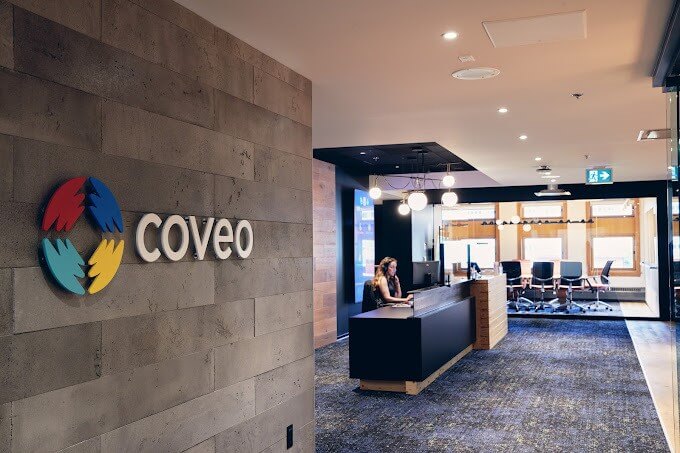As artificial intelligence (AI) increasingly becomes commercialized, its potential for missteps also grows. Québec City-based Coveo wants to remove the possibility of poor information from the chat-based model of AI, and is integrating what it calls the best conversational technologies to create new solutions.
One of the most popular AI models currently is ChatGPT, or generative pretrained transformers, which is essentially how generative AI learns how to take actions from past data and create brand new content. Unlike other IT software, it does not just simply categorize content.
However, all that intelligence comes with some downsides, according to Coveo’s CEO, Louis Têtu. Ask ChatGPT to write a 200-word poem that rhymes with Lake Ontario, and it will, he said in an interview with Betakit. “It will sound great, have great syntax, and really it will create that with a lot of intelligence.”
On the flip side, Têtu noted, the data core used to produce that content is not current, dating back to October 2021. Another known issue with generative AI is it “hallucinates,” which data scientists refer to as the tendency for AI to generate text that is valid grammatically and syntactically, but contradicts common sense or is factually incorrect.
Têtu recalled that a friend once told him ChatGPT or generative AI can lie with great confidence, creating great dissertations that are just plain wrong.
All of these become issues for enterprise customers who rely on factual information, and comes at a time when enterprises are starting to integrate different AI models into their day-to-day business dealings.
For instance, Shopify announced that it’s using ChatGPT for its new shopping assistant to help customers with search inquiries and make personal recommendations based on the user’s requests. Instacart is using the same AI to provide recipe recommendations and ingredient alternatives.
“That’s a great application,” Têtu said of Instacart. “There’s no consequences and it will generate a recipe, or invent a recipe based on known information, and all of that obviously old data that dates back to October 2021…and it’s not very consequential.”
But, he noted that enterprises need to serve people with what he referred to as highly relevant responses, and that they won’t risk their brands with a system that makes up stuff one time out of four.
Essentially, Coveo is using its current platform, the Coveo Relevance Cloud. The latter indexes secure data such as customer records, customer relationship information, knowledge bases of all sorts, engineering databases, content across ERP systems, and databases that are anything from financial markets information to engineering documents, account history.
Têtu said Coveo is in an unique position to feed large language models because of the hundreds of millions of dollars it’s invested into building its AI infrastructure over the past decade. He noted that many large tech companies use Coveo, including Salesforce, Dell, HP, Intel, and Adobe.
The company’s “AI‐powered relevance platform,” offers search, recommendation, and personalization solutions for commerce, service, website, and workplace applications using the indexed content from its clients.
Têtu said its new platform is designed to identify what is most relevant to, say, an accountant
“This is critically important if you’re H&R Block and you have 100,000 advisors helping customers all over the world do their tax returns,” Têtu said. “You wouldn’t want your tax return to be prepared using a legislation that is a year and a half old, or worse, using a legislation article that would have been invented by generative AI algorithms.”
The Coveo Relevance Generative Answering is a new capability within the Coveo Relevance Cloud AI platform. This capability will leverage multiple large language-learning models, depending on the use case, to deliver the best answer, combining these large language model technologies with its own enterprise search and relevance technology.
For example, in a self-service use case, Coveo already creates a unified index of all customer service and knowledge documents within an enterprise, wherever they live, and keeps them fresh, secure, and private. When a specific user searches for an answer, it will search this unified index, with the security that this user has access to, and return the most relevant content for the context of this user.
Most recently, Canada’s artificial intelligence (AI) cluster Scale AI announced that it is investing a cumulative $17.2 million across 12 projects dedicated to scaling the adoption of AI in supply chains. Coveo was among the companies receiving funding, getting the lion’s share to develop machine learning and personalization algorithms that consider not only the revenue generated but also the overall profitability of a transaction.
These algorithms will use new data about margins, storage costs, shipping costs, disposal costs, return costs and others to measure and optimize the end-customer full basket’s profitability. This project ultimately aims to empower merchandisers with profitability-aware reporting, recommended actions, advanced A/B testing and statistical analysis to help them make more informed decisions.
In terms of its revised platform, Coveo plans to work closely with some key customers, testing the technology over the next few months, with an eye to making it more broadly available next summer (that platform went live in June).
“This is technology that is going to be very hard to replicate,” Têtu said. “We’re very confident of our advance here.”


